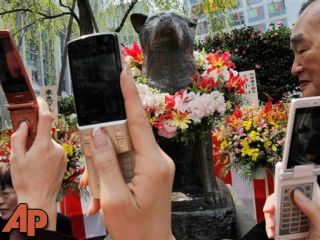
People take photos of a bronze statue of Japanese Akita dog "Hachi" during the 74th memorial service for the dog, intimately called Hachiko, in front of Shibuya railway station in Tokyo. (AP Photo/Itsuo Inouye, FILE)
Click image to enlarge |
TOKYO (AP) - Scientists have settled a decades-old mystery by naming a cause of death for Japan's most famous dog, Hachiko, whose legendary loyalty was immortalized in a Hollywood movie starring Richard Gere. They say Hachiko died of cancer and worms, not because he swallowed a chicken skewer that ruptured his stomach - as legend had had it. For years, Hachiko used to wait at Shibuya train station for its master, a professor at the University of Tokyo. Even after the professor died, the dog went to the station to wait for his master every afternoon for a decade until he finally died. Tokyo residents were so moved that they built a statue of Hachiko at the station, which remains a popular rendezvous spot for Japanese today. He was also the hero of Japanese children's books. The dog's story turned into a 2009 Hollywood film, "Hachi: A Dog's Story," starring Richard Gere - a remake of a 1987 Japanese movie. Hachiko was considered such a model of devotion that his organs were preserved when he died in 1935. Rumor had it that Hachiko died after wolfing down a skewer of grilled chicken - Japanese barbecue called yakitori - that ruptured his stomach. But University of Tokyo veterinarians examining his innards said Wednesday that they found Hachiko had terminal cancer and also a filaria infection - worms. Four yakitori sticks remained in Hachiko's stomach, but they did not damage his stomach or cause death, said Kazuyuki Uchida, one of veterinarians.
"Hachiko certainly had yakitori given by a street vendor at Shibuya," he said. "But the sticks were unrelated to his death, and the rumor is groundless."
By MARI YAMAGUCHI
Associated Press
Δεν υπάρχουν σχόλια:
Δημοσίευση σχολίου